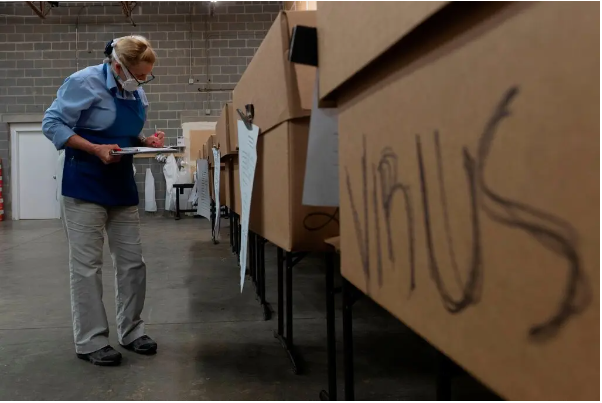Like a zombie in a horror film, the coronavirus can persist in the bodies of infected patients well after death, even spreading to others, according to two startling studies.
The risk of contagion is mainly to those who handle cadavers, like pathologists, medical examiners and health care workers, and in settings like hospitals and nursing homes, where many deaths may occur.
While transmission from corpses is not likely to be a major factor in the pandemic, bereaved family members should exercise caution, experts said.
“In some countries, people who have died of Covid-19 are being left unattended or taken back to their homes,” said Hisako Saitoh, a researcher at Chiba University in Japan who published two recent studies on the phenomenon.
“Therefore, I think that it is a knowledge that the general public should be aware of,” he wrote in an email.
Several studies have found traces of infectious virus in corpses for as long as 17 days after death. Dr. Saitoh and his colleagues went further, showing that dead bodies may carry significant amounts of infectious virus, and that dead hamsters can transmit it to live cage mates.
The research has not yet been vetted for publication in a scientific journal, but outside experts said that the studies were well-done and the results compelling.
The risk of a live patient spreading the coronavirus is far greater than the potential transmission from corpses, Dr. Saitoh and other scientists emphasized.
If infection from corpses accounted for a large number of cases, “we would have noticed, right?” said Vincent Munster, a virologist at the National Institute of Allergy and Infectious Diseases.
Still, “If there is an infectious virus, there is always a risk for transmission,” he continued. “I don’t think it’s something which is often addressed.”
In the United States, bodies usually are embalmed soon after death or cremated. But in the Netherlands, where Dr. Munster grew up, as in many parts of the world, family members may wash and dress the bodies.
In July 2020, the Japanese government urged bereaved family members to keep their distance from dead bodies and refrain from touching them — or even viewing them. Officials also recommended sealing corpses in impermeable bags and cremating them within 24 hours.
The guidelines were revised in May 2022 to allow family members to see loved ones who died of Covid, but “in an appropriately infection-controlled hospital room.”
Those guidelines in part prompted Dr. Saitoh to explore what happens to the virus in the body after death.
He and his colleagues looked at samples from the noses and the lungs of 11 people who had died of Covid. The researchers found that high amounts of virus persisted in six of the 11 corpses, even 13 days after death.
“It was surprising that infectious titers were preserved at the same high levels as in the clinical patients,” Dr. Saitoh wrote. “What was most surprising, however, were the results of the animal experiments.”
In those experiments, he and his colleagues found that hamsters that died within a few days of becoming infected with the coronavirus could transmit it to other animals. In people, too, contagion is most likely when a patient dies soon after infection, when the levels of virus in the body are very high, the researchers said.
The team found more virus in the lungs of human corpses than in the upper respiratory tract. That suggests that those who perform autopsies should be particularly careful when handling the lungs, experts said. Dr. Saitoh pointed to a study from Thailand describing a forensic practitioner who appeared to have been infected during work.
Gases that build up after death can be expelled through any orifice in the body, including the mouth, and may carry infectious virus, the researchers said. Embalming or practicing so-called “angel care” — a Japanese ritual in which the mouth, nose, ears and anus are plugged with cotton pads — prevented transmission, they found.
Contagious corpses are not without precedent. Most famously, funeral and burial practices have triggered large outbreaks of Ebola virus in Africa.
But the coronavirus is very different, noted Angela Rasmussen, a research scientist at the Vaccine and Infectious Disease Organization at the University of Saskatchewan in Canada.
Up to 70 percent of those infected with Ebola die, compared with about 3 percent of those diagnosed with Covid-19. And the Ebola virus floods every part of the body, so the risk of transmission, even after death, is far greater than that posed in theory by the coronavirus.
“With Ebola, it’s clearly direct contact with bodily fluids, because there’s high titers of Ebola pretty much everywhere in somebody who’s died from Ebola,” Dr. Rasmussen said.
Latest Stories
-
Paris 2024: Opening ceremony showcases grandiose celebration of French culture and diversity
2 hours -
How decline of Indian vultures led to 500,000 human deaths
3 hours -
Paris 2024: Ghana rocks ‘fabulous fugu’ at olympics opening ceremony
3 hours -
Trust Hospital faces financial strain with rising debt levels – Auditor-General’s report
4 hours -
Electrochem lease: Allocate portions of land to Songor people – Resident demand
4 hours -
82 widows receive financial aid from Chayil Foundation
4 hours -
The silent struggles: Female journalists grapple with Ghana’s high cost of living
4 hours -
BoG yet to make any payment to Service Ghana Auto Group
4 hours -
‘Crushed Young’: The Multimedia Group, JL Properties surprise accident victim’s family with fully-furnished apartment
5 hours -
Asante Kotoko needs structure that would outlive any administration – Opoku Nti
5 hours -
JoyNews exposé on Customs officials demanding bribes airs on July 29
6 hours -
JoyNews Impact Maker Awardee ships first consignment of honey from Kwahu Afram Plains
7 hours -
Joint committee under fire over report on salt mining lease granted Electrochem
7 hours -
Life Lounge with Edem Knight-Tay: Don’t be beaten the third time
7 hours -
Pro-NPP group launched to help ‘Break the 8’
8 hours

